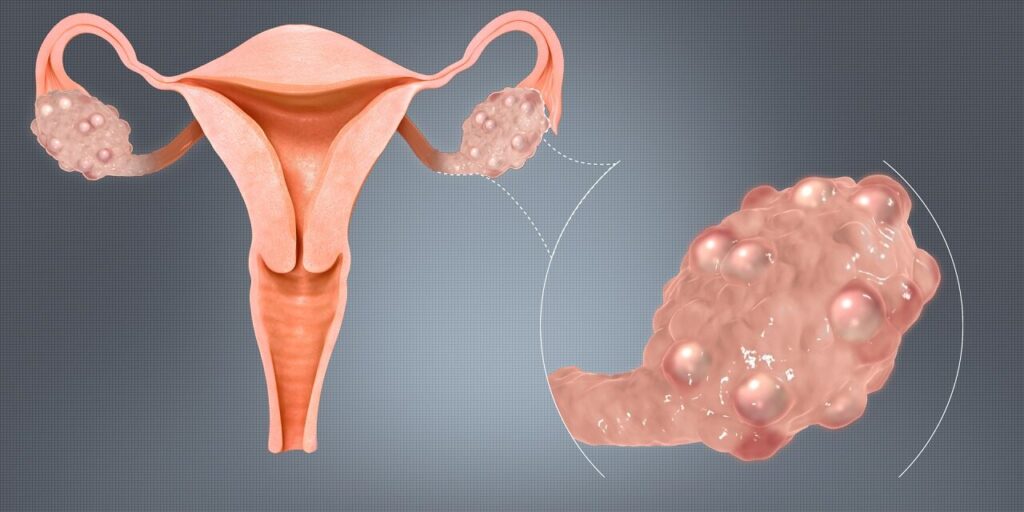PCOD Treatment in pune

PCOD Treatment in pune
The reproductive organs in women that generate progesterone and oestrogen hormones, that help in controlling the menstrual cycle, as well as minor amounts of blocking, relaxing, and androgen hormones, which are male hormones, are affected by PCOD or PCOS. Around 10% of women worldwide experience PCOD. Compared to PCOD, women with PCOS produce higher levels of male hormones than typical. They miss menstruation and have difficulty getting pregnant as a result of this hormone imbalance. In addition to erratic hormone behaviour, this illness can lead to:
- Diabetes
- Infertility
- Rosacea
- Increased hair growth
It’s a somewhat usual illness for which there is no known cure.
What Is the Problem with PCOD?
PCOD stands for polycystic ovarian disease in medical terminology. PCOD, or polycystic ovarian disease, is a medical condition in which a woman’s ovaries generate a large number of immature or partially mature eggs, which eventually develop into ovarian cysts. These lead to growth of the ovaries and a higher production of androgens, the male hormones that cause irregular menstruation periods, hair loss, and excessive weight gain. Changes in food and lifestyle can help manage PCOD.
What are the common symptoms of PCOD problem?
Some women initially notice symptoms around the time of their first menstruation, while others don’t notice symptoms until they’ve put on a lot of weight or are having difficulties getting pregnant. In females, the most typical indications and symptoms of PCOD Problem or PCOS are:
- Menstruation irregularities (Oligomenorrhea):
- Menstruation that is skipped or missing (amenorrhea)
- Menorrhagia, or excessive menstrual bleeding
- Excessive facial and body hair growth, including on the back, belly, and chest
- Acne on the upper back, chest, and face
- Gaining weight
- Hair loss (thinning and falling out of the scalp)
- Darkening of the skin (under the breasts, in the groin, and on the neck)
What Causes PCOD (Polycystic Ovarian Disease)?
The majority of PCOD cases are genetic in nature and primarily run in the family. However, there are also a number of additional physiological reasons. So let’s examine them now!
- Production of Insulin: The pancreas produces insulin. It is a naturally occurring hormone that aids in controlling the body’s blood sugar levels and metabolism. Studies show that PCOD is caused by an increased insulin level. PCOD is caused by the body producing more testosterone as a result of too much insulin in the body.
- Inflammation: The body may also experience low-grade inflammation as a cause of PCOD. Inflammation in the body’s tissues can also result from a number of autoimmune disease types. This causes the body to produce more male hormone, which ultimately causes PCOD.
- High Androgen Levels: The masculine hormone known as Androgen is linked to skin conditions, acne on the face, and an abundance of body hair. These problems also grow with an increase in this hormone. In the end, PCOD results from these physiological problems. Any of these factors may lead to PCOD. It’s crucial to treat them as well, though, once you’ve determined the source. This is the way that PCOD is treated.
How to cure pcod problem permanently?
Although there is no perfect treatment for PCOD, it is not a major issue. The management of PCOD and its associated symptoms can be achieved by maintaining a healthy weight, according to a complex carbohydrate diet, exercising frequently, and engaging in physical activity. It’s also advised for females to routinely see their primary care physician and gynecologist in order to maintain good health in the future.
If you would like more information about PCOD treatment, don’t hesitate to get in touch with Alatkar Hospital. Our top goal is your health, and we are eager to support you on your path to improved health. The services provided by Alatkar Hospital are available to Hadapsar, Pune surrounding communities.
